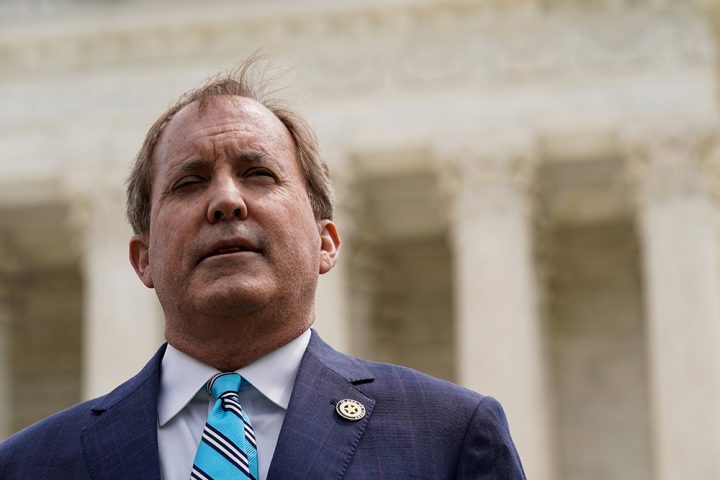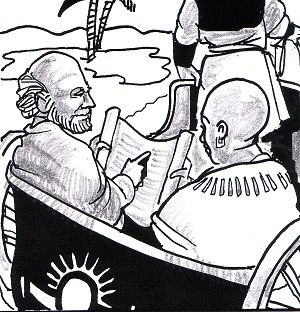
For many Christians, power is a dirty word, conjuring up images of tyrannical abuse against the powerless. Author Ann M. Garrido believes God gives all human beings power — we just need to learn how to exercise it in healthy and holy ways. In her new book Redeeming Power: Exercising the Gift as God Intended (Ave Maria Press, 2024), Garrido draws on interviews with 40 ministry leaders, along with analysis of the creation stories in Genesis, to come up with a spirituality of power that she believes can help anyone trying to effect change.
Garrido is associate professor of homiletics at Aquinas Institute of Theology in St. Louis and has served in a variety of administrative positions. Two of her previous books also looked at difficult aspects of leadership: Redeeming Administration (2013) and Redeeming Conflict (2016). She also is the author of Let’s Talk About Truth (2020) and #Rules_of_Engagement (2021, all Ave Maria Press).
Redeeming Power features brief biographies and insights from companions on the journey, including Maria Montessori, Nicholas Black Elk, Benedict of Nursia, Kaloli Lwanga, Thea Bowman, Hildegard of Bingen, Mark Ji Tianxiang, Margaret of Scotland and Jean-Baptiste de La Salle. Garrido’s interviews with the 40 ministry leaders are available as a podcast called « Waking Up Goliath. »
What follows is an edited version of NCR’s interview with Garrido.
NCR: Why did you want to write about power and why do you think power is something that needs « redeeming »?
Garrido: A lot of us are very nervous around the language of power. Some people see power as a zero-sum thing, that either you have it or you don’t, and that there are limited sources of power. Power is also seen as negative or inherently oppressive. But I don’t think it has to be.
I think we need to be thinking about these questions of power, but also about the framework for talking about them. From a Catholic philosophical framework, every human being has some form of power. There are multiple sources of power, not just purely from economics or from roles or authority. I also believe we can exercise power in a way that has the capacity for it to be a holy and healthy thing for the communities we serve.
Redeeming Power: Exercising the Gift as God Intended
Ann M. Garrido
256 pages; Ave Maria Press
$17.95
When I looked at Jesus as someone who is a model for living, including a model for living power, I started thinking about where Jesus’ concept of power came from. In the book, I argue that his understanding of power was deeply grounded in the Scriptures, especially from the very beginning of Genesis.
For us to exercise holy and healthy power as Christians, it’s good for us to ground ourselves in Scripture. A lot of people, even in church life, are struggling to find a philosophical underpinning for doing what they are called to do. I think Scripture can provide that.
You use Jewish resources, as well as Christian ones, to analyze the Genesis creation stories in your book. What did you learn from Jewish resources and from your own experiences working and studying with Jews?
I began to see power in more positive terms. In Jewish communities, there is a consciousness that we as human beings are supposed to be playing a very active role in the transformation of the world, what they call tikkun olam, or the healing of the earth. It’s almost parallel to what Christians call the reign of God. For Jews, human beings are meant to be very active partners in that transformation. We are created with power and meant to exercise it. It’s not something to be set on a shelf.
Sometimes Christians, because we see ourselves as peacemakers and don’t want to be perceived as aggressive or domineering, are hesitant to use our power. My students who are Jewish taught me that if I have been given power and don’t use it, that’s also an abuse of power. I don’t need to avoid power, or be scared that I would instantly become an oppressor. I need to use power for the reign of God.
How can Jesus be a model for how Christians can use power in a holy and healthy way?
Writing this book really transformed how I think about Jesus. I grew up thinking of Jesus as meek, the Lamb of God being led to the slaughter without any resistance at all. He was poor and powerless. But when I began to look at Jesus through a power lens, I began to realize Jesus was actually very powerful.
He didn’t have some of the sources of power we traditionally associate with the powerful: He wasn’t an official priest in the temple. He didn’t have political power, or economic power. But all of Jesus’ behaviors in the Gospels are the behaviors that research associates with people who believe themselves to have power.
For example, Jesus asked 308 questions in the Gospels and only answered eight. People who experience themselves as having power tend to ask a lot of questions. If you have little power, you don’t want to question authority because the consequences might be harsh. Jesus said things others weren’t saying and asked questions others were hesitant to ask. He clearly had a tremendous sense of internal power, even though it wasn’t coming from external circumstances.
How do you see power being exercised in our political sphere today?
In many places power is being exercised in unhealthy ways. The biggest thing I would assert — and that I asserted in my book, Let’s Talk About Truth — is that the healthy exercise of power has to be first grounded in truth. If a person doesn’t have a deep and abiding commitment to figure out what is true, there’s no way the exercise of power can go well.
Too often, it seems that justice lies in whoever has the most power and can maneuver the systems, rather than on an objective read of reality. I am really vested in trying to bridge polarization and help people come in conversation with each other. But the thing I will never back down on is whenever we enter into conversation, when we try to navigate power, the very first commitment has to be to try to know what’s true.
That doesn’t mean I know the fullness of truth, or that I have truth all wrapped up in my pocket. It means I have a fundamental commitment to trying to figure out what’s real. And I can’t exercise good power without a commitment to what’s real.
Advertisement
Are there similar problems with power being exercised in an unhealthy way in the church?
I think the greatest abuse of power in the church probably happens when people who do have power don’t exercise it, because they’re trying to be too kind or too forgiving or because they give too many second chances. Really bad behavior goes without any formal accountability because leaders are hesitant to do anything about it. Oftentimes, because of the way Christians have interpreted Jesus’ commandment not to judge, we’ve been hesitant to judge when it’s needed.
It’s partly why I wanted to write a book for Christian leaders, because I think a lot of the stuff that’s written about power isn’t touching on our experience of it. Christians often think of power as something that others have that we shouldn’t get too close to. Nobody wants to be a person of power.
In fact, the greatest damage is done by people who objectively have power but internally don’t believe they have power. People who experience themselves as powerful have certain behaviors. Sometimes a person who is in a position of power, maybe a pastor, behaves in ways that people who don’t believe they have power behave. Those people have not lived into the power that they do have.
Do you see the church’s current emphasis on synodality as a type of shared power?
I think synodality was underneath what I was writing in the chapter on « Exercising the Power to Convene » and the one on « Exercising the Power to Bless, » which both touch on ways to share power more widely. As we approach the synod in October, I’m getting excited about what possibilities are there.
But unless models of convening are done well, it can feel that they might produce deeper relations but not a lot of « product » at the end. Sometimes there’s not a lot of feeling of clarity in process-based stuff, and it can leave things more muddled at the end of the day. Finding processes that both share power and move to action is a fine art form.



